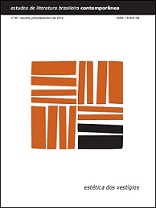Gênero e ambivalência sexual na ficção de Caio Fernando Abreu:
um olhar oblíquo sobre Onde andará Dulce Veiga?
DOI:
https://doi.org/10.1590/S2316-40182012000200012Abstract
Este artigo tem como objetivo investigar como Caio Fernando Abreu simultaneamente constrói, representa e esfacela a ideia de identidades sexuais monolíticas em seu romance Onde andará Dulce Veiga? (1990). Usando ferramentas analíticas advindas da narratologia e dos estudos de gênero, esta leitura do romance de Abreu tenta compreender o papel dos entrecruzamentos culturais no que diz respeito aos modos de narração disruptivos no que tange à s noções preconcebidas de identidade nacional/sexual brasileira.References
ABREU, Caio Fernando (1970). Limite branco. Rio de Janeiro: Expressão e Cultura.
________ (1975). Pedras de Calcutá. São Paulo: Alfa-ômega.
________ (1990). Onde andará Dulce Veiga? São Paulo: Companhia das Letras.
________ (1996a). Pequenas epifanias. Porto Alegre: Sulina.
________ (1996b). “As quatro irmãs (psico-antropologia fake)”. Sui Generis, v. 2, n. 10, p. 22-23.
________ (2002). Cartas. Organização e notas de Ãtalo Moriconi. Rio de Janeiro: Aeroplano.
________ (2007). Onde andará Dulce Veiga? 2. ed. Rio de Janeiro: Agir.
ACHUGAR, Hugo (2006). Planetas sem boca: escritos efêmeros sobre arte, cultura e literatura. Trad. Lyslei Nascimento. Belo Horizonte, Editora UFMG.
BAL, Mieke (1997). Narratology. 2. ed. Buffalo: The University of Toronto Press.
BAUMAN, Zygmunt (2000). Modernidade líquida. Trad. Plínio Dentzien. Rio de Janeiro: Jorge Zahar Editor.
BUTLER, Judith (1993). Bodies that matter. London: Routledge.
________ (1999a). Subjects of desire: Hegelian refl ections in twentieth-century France. Columbia: Columbia University Press.
________ (1999b). Gender trouble: feminism and the subversion of identity. 10th Anniversary Edition. London: Routledge.
________ (2004). Undoing gender. London: Routledge.
CARRIGAN, Tim; CONEEL, Bob; LEE, John (1997). “Hard and heavy: toward a new sociology of masculinity”. In: KAUFMAN, Michael (Ed.). Beyond patriarchy: essays by men on pleasure, power and change. Toronto: Oxford University Press.
CASTIGLIA, Chistopher (1990). “Rebel without a closet”. In: BOONE, Joseph; CADDEN, Michael (Eds.). Engendering men: the question of male feminist criticism. New York: Routledge.
DANIEL, Herbert; PARKER, Richard (1991). AIDS: a terceira epidemia. São Paulo: Iglu.
GASPARI, Elio (2002). A ditadura escancarada. São Paulo: Companhia das Letras.
HUTCHEON, Linda (2000). Teoria e política da ironia. Trad. Julio Jeha. Belo Horizonte: UFMG.
KOJÈVE, Alexander (1947). Introduction à la lecture de Hegel. Paris: Gallimard.
LACAN, Jacques (1998). Escritos. Trad. Vera Ribeiro. Rio de Janeiro: Jorge Zahar.
LEAL, Bruno (2002). Caio Fernando Abreu, a metrópole e a paixão do estrangeiro. São Paulo: Annablume.
LEJEUNE, Phillipe (1975). Le pacte autobiographique. Paris: Seuil.
NORA, Pierre (1986). Lieux de mémoire. Paris: Gallimard.
PUIG, Manuel (1994). El beso de la mujer araña. New York: Vintage.
RODRIGUES, Nelson (1990). “O beijo no asfalto”. In: Teatro completo de Nelson Rodrigues. v. IV: Tragédias cariocas II. Organização de Sábato Magaldi. Rio de Janeiro: Nova Fronteira.
SEDGWICK, Eve Kosofsky (1990). “Axiomatic”. In: The epistemology of the closet. Berkeley, Los Angeles: University of California Press.
SONTAG, Susan (1987). “Notas sobre o camp”. In: Contra a interpretação. Trad. Ana Maria Capovilla. Porto Alegre: L&PM.
TERTO, Veriano (2002). “Homossexualidade e saúde”. Horizontes Antropológicos, v. 8, n. 17, p. 146-166.
TRINDADE, Vivaldo (2006). “Onde andará Dulce Veiga?, um pastiche noir”. Gatilho, ano 2, v. 3.
WITTIG, Monique (2002). The straight mind and other essays. Boston: Beacon Press, 2002.
Downloads
Published
Issue
Section
License
Authors who publish in this journal agree to the following terms:
a) The authors maintain the copyright and grant the journal the right of first publication, the work being simultaneously licensed under the Creative Commons Attribution License-Non Commercial 4.0 which allows the sharing of the work with acknowledgment of the authorship of the work and publication this journal.
b) Authors are authorized to enter into additional contracts separately, for non-exclusive distribution of the version of the work published in this journal (eg publish in institutional repository or as a book chapter), with authorship recognition and publication in this journal.
c) Authors are allowed and encouraged to publish and distribute their work online (eg in institutional repositories or on their personal page) after the editorial process, as this can generate productive changes, as well as increase the impact and citation of published work (See The Effect of Free Access).
d) The authors of the approved works authorize the magazine to, after publication, transfer its content for reproduction in content crawlers, virtual libraries and the like.
e) The authors assume that the texts submitted to the publication are of their original creation, being fully responsible for their content in the event of possible opposition by third parties.


